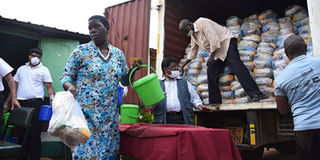Kibera chaos and elephant in the room

Deep Sea slum residents in Parklands, Nairobi County, receive relief food from Hindu Swayamsevak Sangh organisation on April 2, 2020 to shield them from effects of the coronavirus pandemic. PHOTO | EVANS HABIL | NATION MEDIA GROUP
What you need to know:
- Social distancing measures enforced by the State have rendered a majority of Nairobi residents jobless and run down small businesses.
- Ignoring the hunger problem will actually make it extremely difficult to deal with the horror that Ms Gates and the epidemiologists have warned us about.
Pictures of scores of people being trampled on during a food relief stampede in Nairobi’s Kibera slum last Friday were quite disturbing.
A majority of the victims were women and children, of course.
In the absence of a coordinated State relief distribution plan for poor urban settlements hit badly by the coronavirus-related economic crisis, various individuals and charities have stepped forward to help.
And it is difficult to fault anyone for doing so. But the kind of logistical blunders that put people’s lives at risk are unacceptable.
The much-publicised event on Friday was associated with the Raila Odinga Foundation, which had reportedly handed the food and assorted supplies to the local administration officials to distribute to the slum residents.
It happened on the same day that Melinda Gates, the co-founder of Bill and Melinda Gates Foundation, warned of a public health horror in developing countries from Covid-19.
SOCIAL UNREST
Ms Gates, citing the case of Ecuador, where bodies are reportedly being picked from the streets, observed that the weak public health systems in these countries will be run down as soon as mass testing campaigns begin to detect the virus in large numbers of people.
God forbid her prediction ever comes to pass! But incidents like the Kibera food stampede suggest that these countries have more immediate problems of hunger and potential social unrest to address.
TV footage showed young people expressing anger at being stopped from going out to work and women worrying about how they will feed their families.
Social distancing measures enforced by the State, including a night curfew heading into its third week and workplace shutdowns, have rendered a majority of Nairobi residents jobless and run down small businesses.
Restrictions on movement in and out the metropolitan area – identified as one of the hotspot zones for the coronavirus alongside the coastal counties of Mombasa, Kilifi and Kwale – for 21 days starting April 6 mean that they can’t escape their current urban misery for temporary refuge in the rural areas.
FOOD SECURITY
The State has set up a national emergency fund to mobilise relief support for the vulnerable groups and waived water bills for the slum dwellers.
But donors to the fund so far have tended to prioritise public health supplies such as personal protective gear, hand sanitisers and medical oxygen.
While these public health supplies are important in light of epidemiological projections of 10,000 people testing positive for the virus by the end of April, they are no substitute for the food and nutrition needs of the vulnerable groups.
Ignoring the hunger problem will actually make it extremely difficult to deal with the horror that Ms Gates and the epidemiologists have warned us about.
Hungry folks will start ignoring social distancing rules. Many people, with already compromised immunity, will drop dead from hunger than the virus.
And the authorities might find themselves having to contend with the elephant in the room – widespread social unrest – too.
[email protected]; otienootieno





